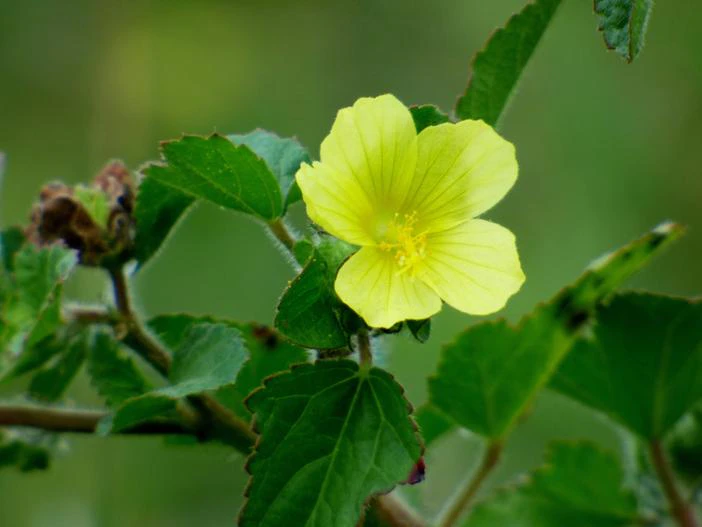Butter Bits
(Pavonia praemorsa)
Butter Bits (Pavonia praemorsa)
/
/

Alejandro Bayer Tamayo
CC BY-SA 2.0
Image By:
Alejandro Bayer Tamayo
Recorded By:
Copyright:
CC BY-SA 2.0
Copyright Notice:
Photo by: Alejandro Bayer Tamayo | License Type: CC BY-SA 2.0 | License URL: https://creativecommons.org/licenses/by-sa/2.0 | Uploader: Josve05a | Publisher: Wikipedia Commons























Estimated Native Range
Climate Requirements for Fort Pierce, Florida
| This Plant | Your Site | Plant Suitability for Your Location | ||
|---|---|---|---|---|
| • Precipitation | 9" - 39" | 53" | Aquatic | Aquatic |
| • High Temp. | 73°F - 97°F | 91°F | Your summer temperatures are normal for this plant. | Excellent |
| • Low Temp. | 29°F - 52°F | 53°F | OK, but your winter temperatures are warmer than normal for this plant | OK |
This plant may not grow well at your location - your precipitation is too high.
Summary
Pavonia praemorsa, commonly known as Butter Bits, is an evergreen shrub native to the Eastern Cape and KwaZulu-Natal provinces of South Africa, where it thrives in coastal forests and scrublands. It typically grows to a height of 4-5 feet (1.2-1.5 meters) and a width of 5-6 feet (1.5-1.8 meters), with a dense, rounded form. The shrub is adorned with bright yellow, hibiscus-like flowers that bloom in spring and fall, adding a splash of color to the garden. The flowers are moderately showy and attract pollinators such as butterflies and bees.
Butter Bits is valued for its drought tolerance and vibrant flowers, making it an excellent choice for water-wise gardens and xeriscaping. It is often used in borders, as a specimen plant, or for informal hedging in warm climates. Gardeners appreciate its low maintenance requirements and adaptability to various soil types, provided they have good drainage. While it prefers full sun, it can tolerate partial shade. There are no widely known popular cultivars of this species. Potential problems include root rot in poorly drained soils and susceptibility to pests like aphids and whiteflies. It is not known to be invasive outside its native range.CC BY-SA 4.0
Butter Bits is valued for its drought tolerance and vibrant flowers, making it an excellent choice for water-wise gardens and xeriscaping. It is often used in borders, as a specimen plant, or for informal hedging in warm climates. Gardeners appreciate its low maintenance requirements and adaptability to various soil types, provided they have good drainage. While it prefers full sun, it can tolerate partial shade. There are no widely known popular cultivars of this species. Potential problems include root rot in poorly drained soils and susceptibility to pests like aphids and whiteflies. It is not known to be invasive outside its native range.CC BY-SA 4.0
Plant Description
- Plant Type: Shrub
- Height: 4-5 feet
- Width: 5-6 feet
- Growth Rate: Moderate
- Flower Color: Yellow
- Flowering Season: Spring, Fall
- Leaf Retention: Evergreen
Growth Requirements
- Sun: Full Sun
- Water: Low, Medium
- Drainage: Medium
Common Uses
Bee Garden, Butterfly Garden, Low Maintenance, Showy Flowers
Natural Habitat
Native to coastal forests and scrublands of Eastern South Africa
Other Names
Common Names:
Scientific Names: Pavonia praemorsa, Pavonia cuneifolia, Hibiscus praemorsus, Abelmoschus decandrus, Hibiscus decandrus, Lass praemorsa, Lassa praemorsa, Malache praemorsa, Urena praemorsa
GBIF Accepted Name: Pavonia praemorsa (L.fil.) Cav.